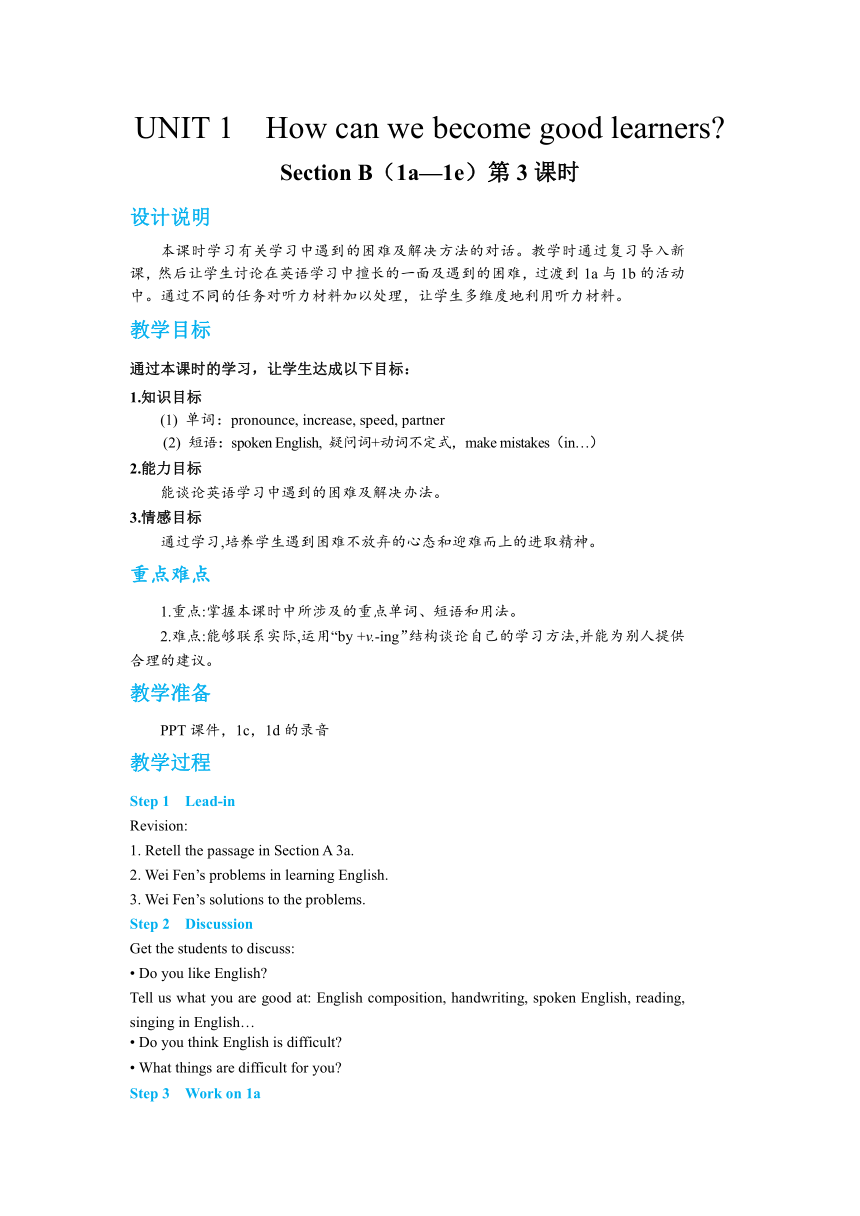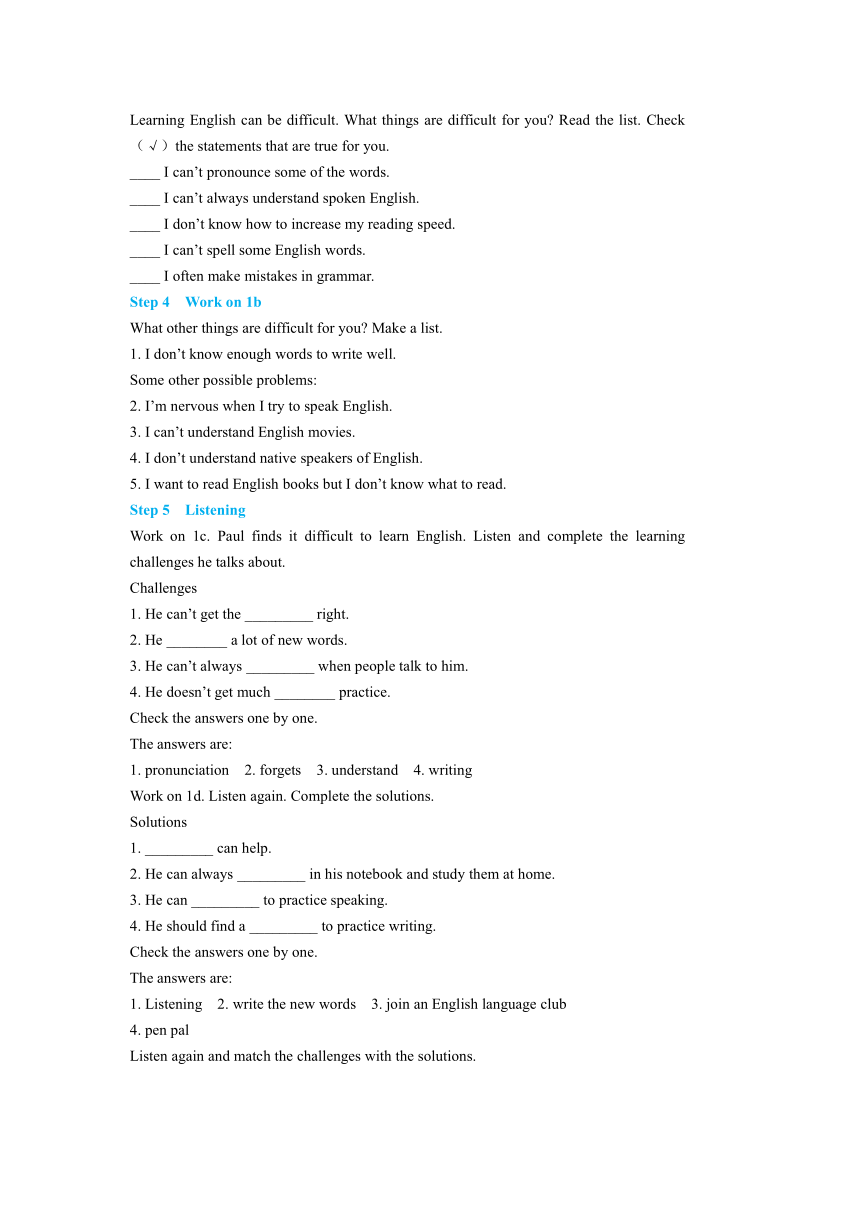Unit 1 How can we become good learners. Section B(1a—1e)第3课时
文档属性
| 名称 | Unit 1 How can we become good learners. Section B(1a—1e)第3课时 |  | |
| 格式 | docx | ||
| 文件大小 | 334.6KB | ||
| 资源类型 | 教案 | ||
| 版本资源 | 人教新目标(Go for it)版 | ||
| 科目 | 英语 | ||
| 更新时间 | 2022-08-05 17:57:15 | ||
图片预览


文档简介
UNIT 1 How can we become good learners
Section B(1a—1e)第3课时
设计说明 本课时学习有关学习中遇到的困难及解决方法的对话。教学时通过复习导入新课,然后让学生讨论在英语学习中擅长的一面及遇到的困难,过渡到1a与1b的活动中。通过不同的任务对听力材料加以处理,让学生多维度地利用听力材料。 教学目标 通过本课时的学习,让学生达成以下目标: 1.知识目标 (1) 单词:pronounce, increase, speed, partner (2) 短语:spoken English, 疑问词+动词不定式,make mistakes(in…) 2.能力目标 能谈论英语学习中遇到的困难及解决办法。 3.情感目标 通过学习,培养学生遇到困难不放弃的心态和迎难而上的进取精神。 重点难点 1.重点:掌握本课时中所涉及的重点单词、短语和用法。 2.难点:能够联系实际,运用“by +v.-ing”结构谈论自己的学习方法,并能为别人提供合理的建议。 教学准备 PPT课件,1c,1d的录音 教学过程 Step 1 Lead-in Revision: 1. Retell the passage in Section A 3a. 2. Wei Fen’s problems in learning English. 3. Wei Fen’s solutions to the problems. Step 2 Discussion Get the students to discuss: Do you like English Tell us what you are good at: English composition, handwriting, spoken English, reading, singing in English… Do you think English is difficult What things are difficult for you Step 3 Work on 1a Learning English can be difficult. What things are difficult for you Read the list. Check(√)the statements that are true for you. ____ I can’t pronounce some of the words. ____ I can’t always understand spoken English. ____ I don’t know how to increase my reading speed. ____ I can’t spell some English words. ____ I often make mistakes in grammar. Step 4 Work on 1b What other things are difficult for you Make a list. 1. I don’t know enough words to write well. Some other possible problems: 2. I’m nervous when I try to speak English. 3. I can’t understand English movies. 4. I don’t understand native speakers of English. 5. I want to read English books but I don’t know what to read. Step 5 Listening Work on 1c. Paul finds it difficult to learn English. Listen and complete the learning challenges he talks about. Challenges 1. He can’t get the _________ right. 2. He ________ a lot of new words. 3. He can’t always _________ when people talk to him. 4. He doesn’t get much ________ practice. Check the answers one by one. The answers are: 1. pronunciation 2. forgets 3. understand 4. writing Work on 1d. Listen again. Complete the solutions. Solutions 1. _________ can help. 2. He can always _________ in his notebook and study them at home. 3. He can _________ to practice speaking. 4. He should find a _________ to practice writing. Check the answers one by one. The answers are: 1. Listening 2. write the new words 3. join an English language club 4. pen pal Listen again and match the challenges with the solutions. Check the answers one by one. The answers are: 1. d 2. a 3. b 4. c Listen again and pay attention to the following sentences. Get the students to have a summary. 给他人提建议的常用句型: Why don’t you do… Why not do… Maybe you should do… You can/could do… What/How about doing… You’d better do… Step 6 Role-play Role-play conversations using the information in 1c and 1d. 1. A: I don’t have a partner to practice English with. B: Maybe you should join an English club. 2. A: I can’t always understand when people talk to me. B:You can join an English language club to practice speaking. Step 7 Language points 1. I can’t always understand spoken English. spoken English 英语口语 有些动词的过去分词可作该词的形容词: spoken口语的 broken坏的, 碎的 written书面的 pieces of broken glass玻璃碎片 written language书面语 2. I don’t know how to increase my reading speed. how to increase my reading speed是“疑问词+动词不定式”结构,在该句中作宾语。这一结构还可作主语和表语。 e.g. I don’t know what to buy for you.我不知道为你买什么。 Can you tell me how to find the differences 你能告诉我怎样可以找出不同之处吗? 【注意】what to do后不需要跟宾语; how to do后必须跟宾语。 【拓展】“疑问词+动词不定式”结构: what which who when + to do where how 3. I often make mistakes in grammar. (1) make mistakes = make a mistake犯错 make mistakes/a mistake in… 在……方面犯错 (2) mistake… for… 把……误认为…… (3) by mistake错误地 Step 8 Homework Preview the passage How Can You Become a Successful Learner on page 6. 当堂达标 Ⅰ. 单项选择。 1. The total number of online literature website users has ________ to 352 million now. And the number is still growing. A. increased B. interested C. included D. introduced 2. Tom, please be more careful. Don’t make mistakes ________ spelling next time. A. with B. in C. for D. at 3. The old man feels lonely, so he needs someone _______. A. to talk B. talking C. to talk with D.to talking to Ⅱ. 根据汉语意思完成英语句子, 每空一词。 1. 有时,我不能理解英语口语。 Sometimes, I can’t understand _________ _________. 2. 请下次不要犯错误了。 Don’t ________ ________ next time, please. 3. 我们必须使发音正确。 We must get _________ __________ __________. 4. 汤姆不能总是记住单词。 Tom _________ _________ __________ the words. 5. 我不知道怎样提高阅读速度。 I don’t know __________ __________ __________ my reading speed. 答案:Ⅰ. 1—3 ABC Ⅱ. 1. spoken English 2. make mistakes 3. the pronunciation right 4. can’t always remember 5. how to increase 板书设计 UNIT 1 How can we become good learners Section B(1a—1e) Why don’t you do… Why not do… Maybe you should do… You can/could do… What/How about doing… You’d better do… spoken口语的 broken坏的,碎的 written书面的 make mistakes = make a mistake make mistakes/a mistake in… mistake…for… by mistake
Section B(1a—1e)第3课时
设计说明 本课时学习有关学习中遇到的困难及解决方法的对话。教学时通过复习导入新课,然后让学生讨论在英语学习中擅长的一面及遇到的困难,过渡到1a与1b的活动中。通过不同的任务对听力材料加以处理,让学生多维度地利用听力材料。 教学目标 通过本课时的学习,让学生达成以下目标: 1.知识目标 (1) 单词:pronounce, increase, speed, partner (2) 短语:spoken English, 疑问词+动词不定式,make mistakes(in…) 2.能力目标 能谈论英语学习中遇到的困难及解决办法。 3.情感目标 通过学习,培养学生遇到困难不放弃的心态和迎难而上的进取精神。 重点难点 1.重点:掌握本课时中所涉及的重点单词、短语和用法。 2.难点:能够联系实际,运用“by +v.-ing”结构谈论自己的学习方法,并能为别人提供合理的建议。 教学准备 PPT课件,1c,1d的录音 教学过程 Step 1 Lead-in Revision: 1. Retell the passage in Section A 3a. 2. Wei Fen’s problems in learning English. 3. Wei Fen’s solutions to the problems. Step 2 Discussion Get the students to discuss: Do you like English Tell us what you are good at: English composition, handwriting, spoken English, reading, singing in English… Do you think English is difficult What things are difficult for you Step 3 Work on 1a Learning English can be difficult. What things are difficult for you Read the list. Check(√)the statements that are true for you. ____ I can’t pronounce some of the words. ____ I can’t always understand spoken English. ____ I don’t know how to increase my reading speed. ____ I can’t spell some English words. ____ I often make mistakes in grammar. Step 4 Work on 1b What other things are difficult for you Make a list. 1. I don’t know enough words to write well. Some other possible problems: 2. I’m nervous when I try to speak English. 3. I can’t understand English movies. 4. I don’t understand native speakers of English. 5. I want to read English books but I don’t know what to read. Step 5 Listening Work on 1c. Paul finds it difficult to learn English. Listen and complete the learning challenges he talks about. Challenges 1. He can’t get the _________ right. 2. He ________ a lot of new words. 3. He can’t always _________ when people talk to him. 4. He doesn’t get much ________ practice. Check the answers one by one. The answers are: 1. pronunciation 2. forgets 3. understand 4. writing Work on 1d. Listen again. Complete the solutions. Solutions 1. _________ can help. 2. He can always _________ in his notebook and study them at home. 3. He can _________ to practice speaking. 4. He should find a _________ to practice writing. Check the answers one by one. The answers are: 1. Listening 2. write the new words 3. join an English language club 4. pen pal Listen again and match the challenges with the solutions. Check the answers one by one. The answers are: 1. d 2. a 3. b 4. c Listen again and pay attention to the following sentences. Get the students to have a summary. 给他人提建议的常用句型: Why don’t you do… Why not do… Maybe you should do… You can/could do… What/How about doing… You’d better do… Step 6 Role-play Role-play conversations using the information in 1c and 1d. 1. A: I don’t have a partner to practice English with. B: Maybe you should join an English club. 2. A: I can’t always understand when people talk to me. B:You can join an English language club to practice speaking. Step 7 Language points 1. I can’t always understand spoken English. spoken English 英语口语 有些动词的过去分词可作该词的形容词: spoken口语的 broken坏的, 碎的 written书面的 pieces of broken glass玻璃碎片 written language书面语 2. I don’t know how to increase my reading speed. how to increase my reading speed是“疑问词+动词不定式”结构,在该句中作宾语。这一结构还可作主语和表语。 e.g. I don’t know what to buy for you.我不知道为你买什么。 Can you tell me how to find the differences 你能告诉我怎样可以找出不同之处吗? 【注意】what to do后不需要跟宾语; how to do后必须跟宾语。 【拓展】“疑问词+动词不定式”结构: what which who when + to do where how 3. I often make mistakes in grammar. (1) make mistakes = make a mistake犯错 make mistakes/a mistake in… 在……方面犯错 (2) mistake… for… 把……误认为…… (3) by mistake错误地 Step 8 Homework Preview the passage How Can You Become a Successful Learner on page 6. 当堂达标 Ⅰ. 单项选择。 1. The total number of online literature website users has ________ to 352 million now. And the number is still growing. A. increased B. interested C. included D. introduced 2. Tom, please be more careful. Don’t make mistakes ________ spelling next time. A. with B. in C. for D. at 3. The old man feels lonely, so he needs someone _______. A. to talk B. talking C. to talk with D.to talking to Ⅱ. 根据汉语意思完成英语句子, 每空一词。 1. 有时,我不能理解英语口语。 Sometimes, I can’t understand _________ _________. 2. 请下次不要犯错误了。 Don’t ________ ________ next time, please. 3. 我们必须使发音正确。 We must get _________ __________ __________. 4. 汤姆不能总是记住单词。 Tom _________ _________ __________ the words. 5. 我不知道怎样提高阅读速度。 I don’t know __________ __________ __________ my reading speed. 答案:Ⅰ. 1—3 ABC Ⅱ. 1. spoken English 2. make mistakes 3. the pronunciation right 4. can’t always remember 5. how to increase 板书设计 UNIT 1 How can we become good learners Section B(1a—1e) Why don’t you do… Why not do… Maybe you should do… You can/could do… What/How about doing… You’d better do… spoken口语的 broken坏的,碎的 written书面的 make mistakes = make a mistake make mistakes/a mistake in… mistake…for… by mistake
同课章节目录
- Unit 1 How can we become good learners.
- Section A
- Section B
- Unit 2 I think that mooncakes are delicious!
- Section A
- Section B
- Unit 3 Could you please tell me where the restroom
- Section A
- Section B
- Unit 4 I used to be afraid of the dark.
- Section A
- Section B
- Unit 5 What are the shirts made of?
- Section A
- Section B
- Review of Units 1-5
- Unit 6 When was it invented?
- Section A
- Section B
- Unit 7 Teenagers should be allowed to choose their
- Section A
- Section B
- Unit 8 It must belong to Carla.
- Section A
- Section B
- Unit 9 I like music that I can dance to.
- Section A
- Section B
- Unit 10 You're supposed to shake hands.
- Section A
- Section B
- Review of Units 6-10
- Unit 11 Sad movies make me cry.
- Section A
- Section B
- Unit 12 Life is full of the unexpected
- Section A
- Section B
- Unit 13 We're trying to save the earth!
- Section A
- Section B
- Unit 14 I remember meeting all of you in Grade 7.
- Section A
- Section B
- Review of Units 11-14
